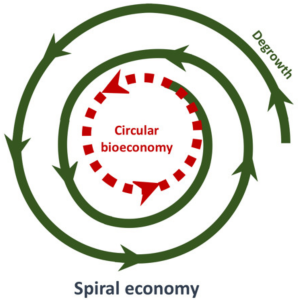 John Bellamy Foster in Monthly Review:
John Bellamy Foster in Monthly Review:
The word degrowth stands for a family of political-economic approaches that, in the face of today’s accelerating planetary ecological crisis, reject unlimited, exponential economic growth as the definition of human progress. To abandon economic growth in wealthy societies means to shift to zero net capital formation. With continual technological development and the enhancement of human capabilities, mere replacement investment is able to promote steady qualitative advancements in production in mature industrial societies, while eliminating exploitative labor conditions and reducing working hours. Coupled with global redistribution of the social surplus product and reduction of waste, this would allow for vast improvements in the lives of most people. Degrowth, which specifically targets the most opulent sectors of the world population, is thus directed at the enhancement of the living conditions of the vast majority while maintaining the environmental conditions of existence and promoting sustainable human development.2
Science has established without a doubt that, in today’s “full-world economy,” it is necessary to operate within an overall Earth System budget with respect to allowable physical throughput.3 However, rather than constituting an insurmountable obstacle to human development, this can be seen as initiating a whole new stage of ecological civilization based on the creation of a society of substantive equality and ecological sustainability, or ecosocialism. Degrowth, in this sense, is not aimed at austerity, but at finding a “prosperous way down” from our current extractivist, wasteful, ecologically unsustainable, maldeveloped, exploitative, and unequal, class-hierarchical world.
More here.
